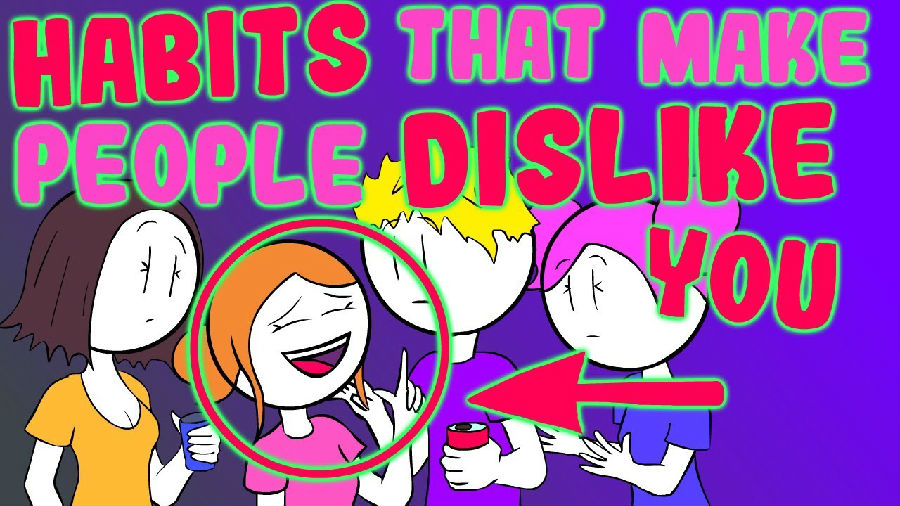(单词翻译:单击)
Hi everyone before we start this video, we wanted to give all of you a big THANK YOU.
大家好,在开始本期视频之前,我们想先感谢大家。
Psych2Go's vision is to make psychology more accessible to everyone.
我们的目标是让每个人都能接触到心理学。
Today's topic is on six habits that may make people dislike you.
今天的话题是可能会让别人不喜欢你的6个习惯。
Whether you like it or not, there are things that you do that make people dislike you.
不管怎样,总有一些事情会让别人讨厌你。
Have you ever walked into a room and there was a know-it-all in the vicinity?
你是否曾经走进一个房间,发现房里有一个万事通?
You can whip up a conversation on any topic and that person would act like an expert.
你可以就任何话题发起一场对话,并且那个人会表现得像个专家一样。
Before you can even gather your emotions and thoughts, you already dislike the person.
在你整理好自己的情绪和想法之前,你已经讨厌这个人了。
On the other hand, you might be that person that has something to say about everything.
另一方面,你可能就是那些什么是都要插句话的人。
The problem is that we aren't always aware of the things that we do that make people dislike us.
问题是我们有时意识不到我们做了一些让别人讨厌我们的事情。
See if you can spot your behavior on the list we provided in this video,
看看你是否能在我们本期视频中找到你的行为
Psych2Go presents to you six habits that make people dislike you.
Psych2Go为大家呈现可能会让别人不喜欢你的6个习惯。
1. Acting too nice.
1. 表现太过友好。
It makes perfect sense that people will like you more when you are extremely kind and nice, right?
当你非常友善的时候,人们会更喜欢你,这是很有道理的,不是吗?
Sorry to burst your bubble but not really, science has proven otherwise.
抱歉戳破了你的美梦,但事实真不是这样,有科学证明。
According to a 2010 study by researchers at Washington State University and the Desert Research Institute,
华盛顿州立大学和沙漠研究所的研究人员于2010年发表的一项研究表明,
people tend to avoid working with people who appear to be too altruistic and unselfish. But why?
人们倾向于避免与那些看起来太无私的人一起工作。为什么?
Turns out participants in the study said that the unselfish teammate made them look bad, while others suspected they had ulterior motives.
结果发现,参与研究的人表示,无私的队友让他们看起来很糟糕,而其他人则会怀疑他们的动机不纯。
2. Asking too many questions.
2. 问太多问题。
When you lead a conversation, asking questions to steer the topic is good.
当你在交谈时,围绕话题提问是件好事。
It tells the other person that you are interested in them. You need to be careful not to ask too many though.
这是在告诉其他人,你对他们感兴趣。你需要注意,不要问太多问题。
If you don't reciprocate and also tell them about your own experiences, this can come off as an interrogation.
如果你不回应,也不告诉他们你自己的经历,这可能会变成一种审问。
You need to balance the conversation and spill the beans from time to time.
你需要平衡这场对话并不时地泄露秘密。
The Journal of Experimental Social Psychology found that people start to dislike you when you are the only one asking questions.
《实验社会心理学期刊》发现当你是唯一一个提问的人时,大家就会开始讨厌你。

This could be in direct communication or through written communication like emails.
这可以是直接沟通,也可以是通过电子邮件等书面沟通。
3. Dropping a personal bomb.
3. 扔个人炸弹。
Being honest is one of the most important things you can do in an interview or when you go out on a date.
在面试或约会中,诚实是最重要的事情之一。
You want to present the best version of yourself as possible.
你想要尽可能展现出最好的自己。
What you don't want to do though is to disclose something extremely personal too early.
但你不想过早地透露一些非常私人的事情。
This sends the message that you are inappropriate and cannot read the social signs and triggers.
这会传递出这样的信息:你觉得不合适,也不能读懂社交信号和触发事件。
For example, it might be inappropriate to share your intimate details about your love life with people you just met.
例如,和刚认识的人分享你感情生活的私密细节可能不太合适。
So what are the things you could share with people you just met?
那么,你可以和刚认识的人分享些什么呢?
Susan Spencer at Illinois State University found that
伊利诺伊州立大学的Susan Spencer发现
speaking about hobbies and likes and dislikes will make you seem warmer and more likeable.
谈论兴趣和喜好会让你看起来更温暖,更讨人喜欢。
4. You often hide your emotions.
4. 你经常隐藏自己的情绪。
Somewhere along in your childhood, it became a common practice to hide and suppress your emotions.
在你童年的某个时候,隐藏和压抑自己的情绪成了一种常见的做法。
This is not the same as controlling your emotions though.
这和控制情绪是不一样的。
Studies have shown that people react better to a truthful display of emotions than hiding them.
研究表明人们对真情流露的反应比对隐藏的反应更好。
For example, someone made you upset because they said something that you think was insensitive,
例如,有些人让你心烦,因为他们说了一些你认为不好的话,
instead of being passive-aggressive and giving them a cold shoulder,
你会和他们做下来,平静的告诉他们自己的感受,
you sit down with them and calmly tell them how you felt when they said what they said.
而不是被动地攻击他们,冷淡地对待他们。
When you understand your emotions you can express anger and sadness appropriately.
你理解了自己的情绪,你就可以适当地表达愤怒和悲伤了。
Don't keep your emotions inside, it is bound to burst out into the open.
不要将情绪藏起来,它一定会爆发出来的。
5. Acting like you don't like someone.
5. 假装你不喜欢某人。
You could potentially turn someone off when you don't express fondness for the person you're meeting.
当你不喜欢你要见的人时,你可能会让对方感到厌烦。
Have you ever heard of the term Reciprocity of Like?
你听说过喜欢互惠吗?
Well, it's actually a phenomenon when we think someone likes us we tend to like them as well.
当我们认为别人喜欢我们时,我们往往也会喜欢他们,这实际上是一种现象。
When we expect people to accept us, we act warmer towards them.
当我们希望别人接受我们时,我们会表现得更热情。
According to a 2009 study by researchers at University of Waterloo and the University of Manitoba,
根据滑铁卢大学和马尼托巴省大学2009年的一项研究,
not sure how a person you're interacting feels about you? Act like you like them and they'll probably like you back.
不确定与你交流的人对你的感觉?表现出你对他们的喜欢,他们可能也会喜欢你。
6. Giving a weak handshake.
6. 无力的握手。
Have you ever greeted someone and found they have a weak handshake?
你有没有遇到过这样的情况:你和别人打招呼时,发现他们的握手很无力?
Do you find it off-putting when someone cannot shake your hand properly. If you do you are not alone.
当别人和你握手不恰当的时候,你会生气吗?如果是,你不是一个人。
When someone has a weak handshake they come across as someone who cannot manage pressure.
当一个人握手软弱无力时,他们会给人一种无法控制压力的印象。
In a study done by the University of Alabama found that undergraduates who had a weak handshake were less positive and likeable.
阿拉巴马大学的一项研究发现,握手无力的大学生不那么积极,也不那么讨人喜欢。
There are bound to be things that you do that will put people off. None of us are perfect and we can't please everyone.
大家肯定会做一些让别人反感的事情。人无完人,我们无法取悦每个人。
However, that doesn't mean you can't try and change the way you do things.
但这并不意味着你不能试着改变自己做事的方式。
If you identify with any of the points mentioned, ask yourself these questions:
如果你认同上面提到的任何一点,问问自己这些问题:
Why do I do the things I do? What beliefs do I have that is causing these behaviors?
我为什么要做这些事情?是什么信念导致了这些行为?
These questions are the first step to understanding yourself more
这些问题是更了解自己、
and altering your beliefs and behavior that do not serve you. What do you think about this list?
改变自己信念和行为的第一步。大家对以上怎么看?
Share with us in the comments below. Subscribe to go for more psychology content.
请在评论下方和我们分享。订阅以获取更多心理学内容。
Don't forget to like and share this video with someone who can benefit from it.
不要忘记点赞并和能从中获益的人分享本期视频。


